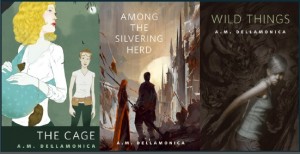I have been trying to finish up a few non-fiction projects before diving into the next one(s) and the story intros are one of the things have been waiting. I set out to write a little something about those stories of mine that are available online in some format, and now I’ve pretty much finished all of them except for my baby werewolf story, “The Cage.” Saving it for last seemed reasonable, since it’s the piece that appeared most recently. It has only been a year since I wrote it, so it’s far less of a blast from the past than something like “A Key to the Illuminated Heretic.”
But I realized last week that when “The Cage,” made the LOCUS recommended reading list, it also went on what they call the drop-down list for the LOCUS reader’s poll. This probably should have been a no-brainer, since I did once write a fair number of reviews for LOCUS and contribute to that list, but I didn’t make the connection until I bought my tickets for the LOCUS shindig in Seattle in June. There are so many lovely things by people I adore on the drop-down list: M.K. Hobson‘s The Native Star is on there, and so is Chill
is on there, and so is Chill , by Elizabeth Bear and stories like Cat Rambo’s “Clockwork Fairies.”
, by Elizabeth Bear and stories like Cat Rambo’s “Clockwork Fairies.”
But this is a wide-open to all readers kind of poll, and you don’t have to restrict yourself to the drop down list. You can write in books and stories, like–for example–Jessica Wynne Reisman‘s “The Vostrasovitch Clockwork Animal and Traveling Forest Show at the End of the World,” or … hey, tell me about all the great fiction you published last year, folks! You’ll be reminding me about stuff I loved, or at the very least stuff I meant to read and temporarily lost in the pile.
Anyway. “The Cage” began with an anthology invite: my agent knew someone who was doing a book of urban fantasy stories with a specific theme–she’d told ’em I was just the thing, and I got the guidelines not long after that. I started researching March 2, 2010 and had a polished draft in hand by April 5th. But not fast enough: the antho filled. Between one thing and another and with a rewrite in between, it ended up zipping off to Tor.com on June 8th, where it got to be the final story in their urban fantasy spotlight.
As my intros for “What Song the Sirens Sang” and “Faces of Gemini” probably show, I love story assignments that come with a bit of a restriction in them. They push me out of the box, moving me into areas I wouldn’t necessarily have gone on my own. Some of my strongest shorts are the ones I wrote for Mojo: Conjure Stories , Alternate Generals III (v. 3)
, Alternate Generals III (v. 3) , and The Faery Reel: Tales from the Twilight Realm
, and The Faery Reel: Tales from the Twilight Realm .
.
In this case, I merged the less familiar element–home renovation–with my own backyard. I made extensive use of my neighborhood and certain communities within Vancouver in writing “The Cage.” The Britannia Community Center branch of Vancouver Public Library, where the story begins, is just a few blocks from my home in little Italy. It is where I pick up my VPL holds and where I got my blue belt in aikido.
The physical terrain is quite faithfully rendered, in other words.
The community is stickier: people always are. But the story draws on the best of my experiences as an activist in the local feminist and queer communities. Catching us on a fictional best day maybe presents a bit of a rose colored view, but it’s not as though that version of the community doesn’t exist. It does–just not all the time. I believe that humans, in singles and in groups, oscillate in and out of states of perfection. That the statement “Nobody’s perfect” should be amended to “Nobody’s always perfect.”
In “The Cage,” Jude’s alternate family discovers or creates one of those perfect moments–one of those days when everyone’s pitching in and pulling together, when nobody’s too burned out or sick or pissed off or scraping after funds or endlessly chewing after consensus on an irrelevant frippery, at a meeting that’s gone on far too long. It’s Team Good Guys FTW, and Chase, Paige and Jude are the ones who benefit.
All that, and it even has romance!
 My wife, my niece and my brother-in-law all have birthdays this week, and so does Tor.com. To celebrate, the latter has collected all of its original fiction into one great big free download of love. You can get it here by registering at the site. It includes three stories by me: “The Cage,” “Among the Silvering Herd,” and “Wild Things.”
My wife, my niece and my brother-in-law all have birthdays this week, and so does Tor.com. To celebrate, the latter has collected all of its original fiction into one great big free download of love. You can get it here by registering at the site. It includes three stories by me: “The Cage,” “Among the Silvering Herd,” and “Wild Things.”


